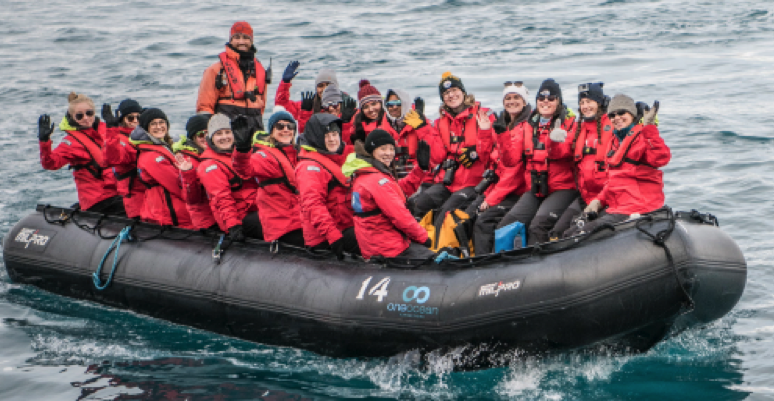
Students in the Faculty of Environment got a chance to experience an arctic expedition from August 31 to Sept. 12.
Students visited Devon Island, Baffin Island, Nunavut, Disko Bay, and Greenland with One Ocean Expedition.
The focus of the trip was the impact of climate change on glaciers.
Amidst the glaciers, sea ice, and wildlife, they learned both from their professors as well as the experts onboard the ship.
One of these experts is Christine Dow, the Canada Research Chair in Glacier Hydrology and Ice Dynamics and assistant professor at UW in the Faculty of Environment.
“The Arctic is warming at least two times as fast as the rest of the world so the impacts of climate change in that region are being felt strongly,” said Dow.
She explained that the group was only able to travel through the region onboard a cruise ship because of drastically reducing sea ice levels.
As one of their excercises, students calculated that the glaciers they visited on Devon Island have been retreating by about 30m per year.
“When we visit for the course next year it will already look very different, and that is a sobering thought,” said Dow.
The students also published a daily blog posts documenting their experiences.
The group visited and had discussions with several communities in Nunavut and Greenland about climate change.
“It’s clear that the changes happening on the Arctic will have severe consequences for the people who live there including thawing permafrost, which will impact infrastructure and overland travel, and also their ability to hunt on the diminishing sea ice,” said Dow.
They were able to spot polar bears, whales, seals, and muskox.
In Cambridge Bay, they learned about the community’s culture, and were welcomed with traditional Inuit country food, like arctic char, narwhal, berries, and caribou.
Their visit ended with learning more about their traditional culture – clothing, throat singing, and Inuit games.
Dow said that what is hapening in the region, which is hugely vulnerable to warming air and ocean temperatures, will have an impact on the rest of the world.
“This is an opportunity for our students to see a part of the world that would otherwise be difficult to access,” she said.
In addition to studying, the students maintained a blog for the duration of the trip.
“Elements of human and physical geography influence each other and create a complex system in the Arctic.
One of the most impactful factors in this system is climate change, and we had the incredible opportunity to witness the changes first hand.
The accelerated retreat of glaciers and lack of sea ice that we saw has helped us to understand the challenges Inuit communities are experiencing and the adaptations they are implementing in order to continue their way of life.
The Arctic is experiencing the most rapid changes in the world, and Inuit communities are the most at risk.” Erin McLeod, one of the students in the expedition mentions in a blog post.
Some of them took the opportunity to do a polar plunge. They were also on a “glacier patrol,” where groups took turns taking pictures of every glacier they sailed past.
Students had to manage their time between lectures, completing school work, assignments, and collecting data.
Throughout this field course, they were able to notice connections between the physical and human geography environment in the Arctic.
Students had a session with the captain of the ship who described his navigation operations and methodology.
They were able to make comparisons between historical and modern navigation techniques and how much everything had advanced.






























